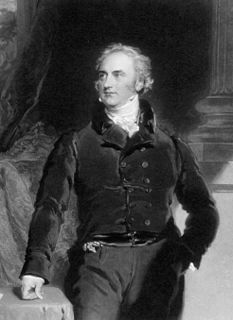A Quote by L. Ron Hubbard
Knowledge is observation and is given to those who would look.
Related Quotes
Men look on knowledge which they learn--or might learn--from others as they do on the most beautiful structures which are not their own: in outward objects, they would rather behold their own hogsty than their neighbor's palace; and in mental ones, would prefer one grain of knowledge gained by their own observation to all the wisdom of a thousand Solomons.
Awareness is observation without choice, condemnation, or justification. Awareness is silent observation from which there arises understanding without the experiencer and the experienced. In this awareness, which is passive, the problem or the cause is given an opportunity to unfold itself and so give its full significance. In awareness there is no end in view to be gained, and there is no becoming, the 'me' and the 'mine' not being given the continuity.
Poem by Howard A. Walter (Character) I would be true, for there are those who trust me; I would be pure, for there are those who care; I would be strong, for there are those who suffer; I would be brave, for there is much to dare. I would be friend of all--- the foe, the friendless; I would be giving, and forget the gift; I would be humble, for I know my weakness; I would look up, and laugh, and love, and lift.
All those formal systems, in mathematics and physics and the philosophy of science, which claim to give foundations for certain truth are surely mistaken. I am tempted to say that we do not look for truth, but for knowledge. But I dislike this form of words, for two reasons. First of all, we do look for truth, however we define it, it is what we find that is knowledge. And second, what we fail to find is not truth, but certainty; the nature of truth is exactly the knowledge that we do find.
What would you consider a good job?" Answered as follows: "A good job is one in which I don't have to work, and get paid a lot of money." When I heard that I cheered and yelled and felt that he should be given an A+, for he had perfectly articulated the American dream of those who despise knowledge. What a politician that kid would have made.
From the dawn of exact knowledge to the present day, observation, experiment, and speculation have gone hand in hand; and, whenever science has halted or strayed from the right path, it has been, either because its votaries have been content with mere unverified or unverifiable speculation (and this is the commonest case, because observation and experiment are hard work, while speculation is amusing); or it has been, because the accumulation of details of observation has for a time excluded speculation.
Nothing is known in our profession by guess; and I do not believe, that from the first dawn of medical science to the present moment, a single correct idea has ever emanated from conjecture: it is right therefore, that those who are studying their profession should be aware that there is no short road to knowledge; and that observation on the diseased living, examination of the dead, and experiments upon living animals, are the only sources of true knowledge; and that inductions from these are the sole bases of legitimate theory.



































